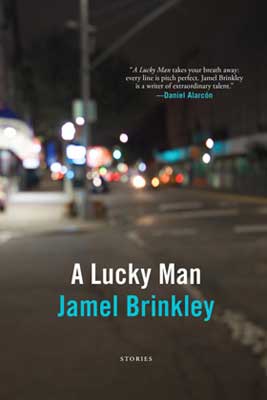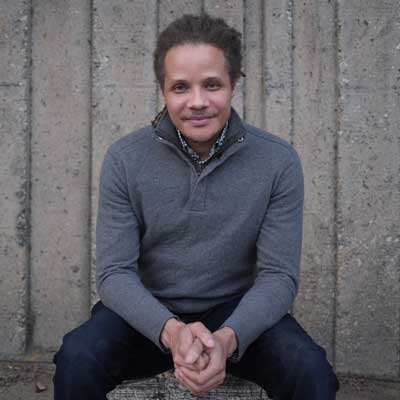A Lucky Man by Graywolf Press / 978-1555978051 / hardcover / May 1, 2018
In his debut short story collection, A Lucky Man, Jamel Brinkley traces the arch of fractured masculinity through the lives of nine black men, ranging from the precipice of puberty to the dimming lights of youth. At first glance, Brinkley’s characters appear to stand and stumble as they try to attain fleeting moments of happiness through sex, alcohol, and recognition from fellow men. However, beneath the surface runs a powerful commentary on man’s search for ever-elusive intimacy.

In many ways, A Lucky Man is a book about fathers. Despite their differences, Brinkley’s characters are tied to generational tales of absence, expectation, and conditional love, told by the men who came before them. When combined, these individual stories become a chorus of voices who must operate within a framework that rewards the accumulation and use of power and rejects vulnerability. At a time when more attention has been given to the ways men abuse their positions of influence, Brinkley refuses to soften or simplify his exploration of the male psyche. Instead, he places his characters in continual confrontation with the worldviews created by their fathers, as their desire for connection becomes tempered by their own expectations.
Brinkley masterfully paces his stories to highlight these moments of connection, moving seamlessly between rapid prose and intricate, meditative description. In “Everything the Mouth Eats,” the narrator describes his brother play a game of capoeira as if in a trance, stating “he showed the man all of his vulnerabilities, just with the placement of a foot, a beautifully timed sweep to put him gently on the floor, letting him know that it isn’t such a horrible thing to fall down.” These moments of intimacy allow Brinkley to enter in the contemplative and pithy, creating potential avenues of realization for characters who appear lost in their ways.

In order to avoid falling into the common literary trope of unhappy men acting out on their unhappiness, Brinkley carefully crafts each story to explore a full spectrum of perspectives. In “Wolf and Rhonda,” the collection’s penultimate piece, Brinkley shifts between the perspectives of Wolf, a man who peaked in his youth, and Rhonda, a woman who’s risen above the rejection she faced as a child, as they meet at their high school reunion for their first time since their sexual encounter years prior. While Wolf’s perspective appears claustrophobically mired by his inability to move beyond his upbringing and unhappiness regarding what his life has become, Rhonda’s sections offer a refreshing reversal of the collection’s masculinity narrative. In the story’s climax, as Wolf descends into pleading for acknowledgment of their experience together, Rhonda notes “his words piled on themselves in a strange rhythm. They formed walls that he could take shelter in. So be it, she thought.” Rhonda, removed and unbothered, observes Wolf’s turmoil from above, allowing readers to look upon the masculinity complex and its corrosive consequences from every angle.
Intimacy often serves as a contradictory concept, something to be both desired and feared, strived for and avoided. Intimate moments, then, prove to be some of the most striking and powerful images in A Lucky Man. Interlocked fingers, childhood dances with imaginary friends, and uninterrupted stares carry the weight of much larger actions as Brinkley’s characters achieve, if only momentarily, true connection. In a collection walled by patriarchal expectations, Brinkley breathes hope into his characters through honest intimacy and offers a potential escape from the destructive generational cycle.





Leave a Reply